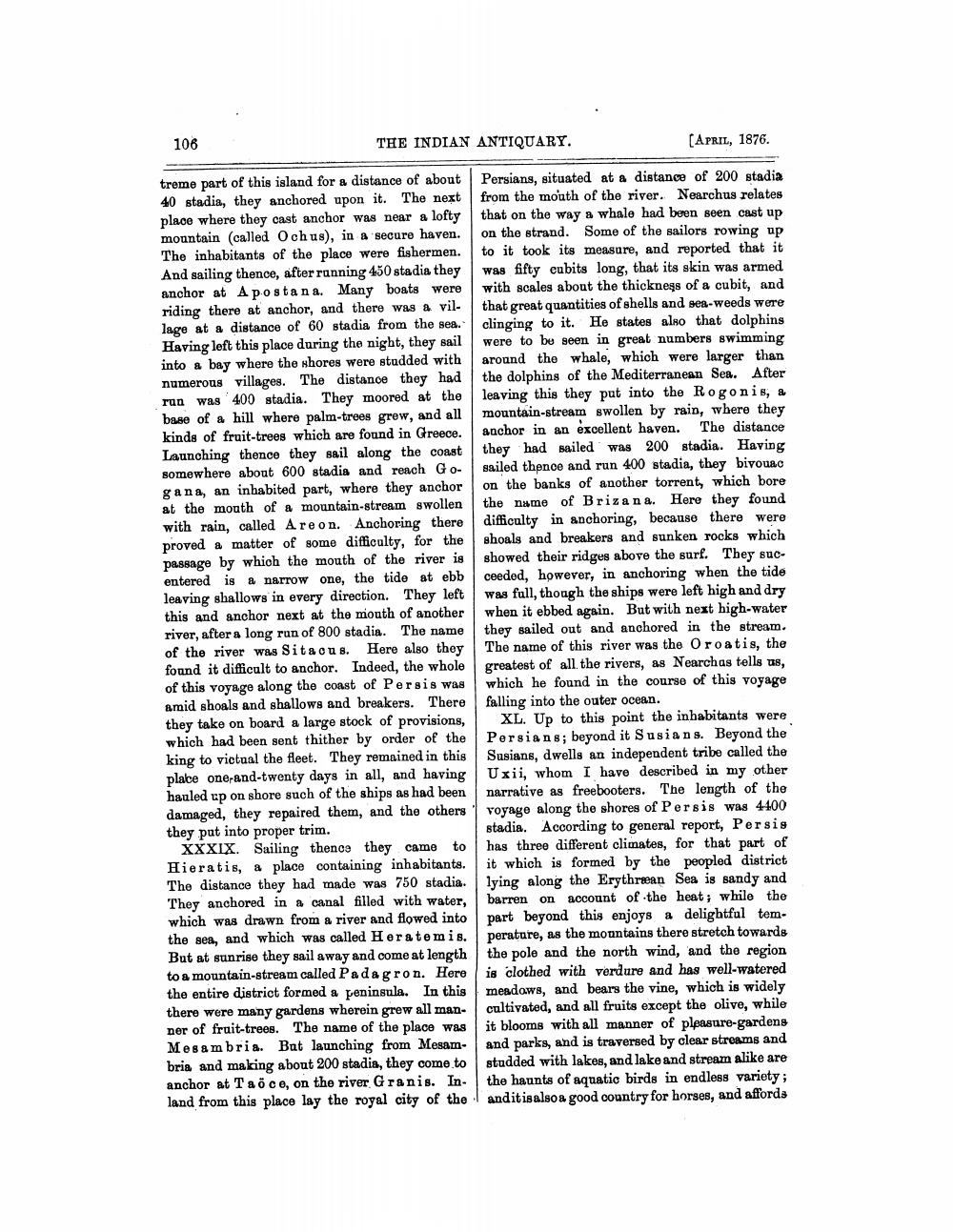________________
106
THE INDIAN ANTIQUARY.
(APRIL, 1876.
treme part of this island for a distance of about 40 stadia, they anchored upon it. The next place where they cast anchor was near a lofty mountain (called Ochus), in a secure haven. The inhabitants of the place were fishermen. And sailing thence, after ranning 450 stadia they anchor at Apostana. Many boats were riding there at anchor, and there was a vil lage at a distance of 60 stadia from the sea. Having left this place during the night, they sail into a bay where the shores were studded with numerous villages. The distance they had run was 400 stadia. They moored at the base of a hill where palm-trees grew, and all kinds of fruit-trees which are found in Greece. Launching thence they sail along the coast somewhere about 600 stadia and reach Go- gana, an inhabited part, where they anchor at the mouth of a mountain-stream swollen with rain, called Areon. Anchoring there proved a matter of some difficulty, for the passage by which the mouth of the river is entered is a narrow one, the tide at ebb leaving shallows in every direction. They left this and anchor next at the mouth of another river, after a long run of 800 stadia. The name of the river was Sitacus. Here also they found it difficult to anchor. Indeed, the whole of this voyage along the coast of Persis was amid shoals and shallows and breakers. There they take on board a large stock of provisions, which had been sent thither by order of the king to victual the fleet. They remained in this plabe onerand-twenty days in all, and having hauled up on shore such of the ships as had been damaged, they repaired them, and the others they put into proper trim.
XXXIX. Sailing thence they came to Hieratis, a place containing inhabitants. The distance they had made was 750 stadia. They anchored in a canal filled with water, which was drawn from a river and flowed into the sea, and which was called Heratemis. But at sunrise they sail away and come at length to a mountain-stream called Padagron. Here the entire district formed a peninsula. In this there were many gardens wherein grew all manner of fruit-trees. The name of the place was Mesambria. Bat launching from Mesambria and making about 200 stadia, they come to anchor at Tao ce, on the river Granis. In land from this place lay the royal city of the
Persians, situated at a distance of 200 stadia from the mouth of the river. Nearchus relates that on the way a whale had been seen cast up on the strand. Some of the sailors rowing up to it took its measure, and reported that it was fifty cubits long, that its skin was armed with scales about the thickness of a cubit, and that great quantities of shells and sea-weeds were clinging to it. He states also that dolphins were to be seen in great numbers swimming around the whale, which were larger than the dolphins of the Mediterranean Sea. After leaving this they put into the Rogonis, a mountain-stream swollen by rain, where they anchor in an excellent haven. The distance they had sailed was 200 stadia. Having sailed thence and run 400 stadia, they bivouac on the banks of another torrent, which bore the name of Briza na. Here they found difficulty in anchoring, because there were shoals and breakers and sunken rocks which showed their ridges above the surf. They succeeded, however, in anchoring when the tide was fall, though the ships were left high and dry when it ebbed again. But with next high-water they sailed out and anchored in the stream The name of this river was the Oroatis, the greatest of all the rivers, as Nearchas tells us, which he found in the course of this voyage falling into the outer ocean.
XL. Up to this point the inhabitants were Persians; beyond it Susia ns. Beyond the Susians, dwells an independent tribe called the Uxii, whom I have described in my other narrative as freebooters. The length of the voyage along the shores of Persis was 4400 stadia. According to general report, Persis has three different climates, for that part of it which is formed by the peopled district lying along the Erythræan Sea is sandy and barren on account of the heat; while the part beyond this enjoys a delightful temperature, as the mountains there stretch towards the pole and the north wind, and the region is clothed with verdure and has well-watered meadows, and bears the vine, which is widely cultivated, and all fruits except the olive, while it blooms with all manner of pleasure-gardens and parks, and is traversed by clear streams and studded with lakes, and lake and stream alike are the haunts of aquatic birds in endless variety; and it is also a good country for horses, and affords




